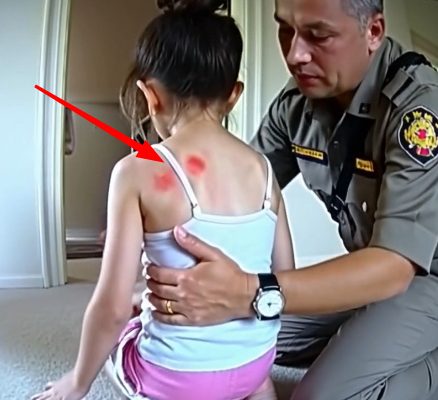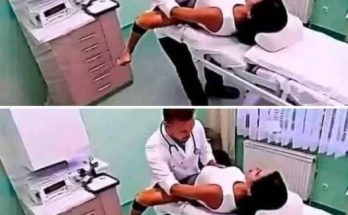Every time I recall the moment Sophie walked back into my home, I feel a surge of emotions. Her usual exuberance had been replaced by a quiet resignation that was unsettling. As a police officer, I’ve seen the look of someone bearing untold burdens many times before, yet seeing it on my own daughter’s face was a different kind of pain.
“Daddy, I need to be stronger,” she said softly, her eyes focused on the floor as if the answers lay somewhere in the pattern of the carpet.
I tried to suppress the rising panic as I helped her with her backpack. When she winced, it felt like a punch to my gut. Carefully, I lifted the back of her shirt and saw the marks—silent yet screaming for justice.
“Where are you feeling discomfort, princess?” I asked, keeping my voice gentle, though inside, a storm was brewing.
“From the ‘training’,” she replied, her voice barely above a whisper. “Nathan says I need special training to get strong. In the basement… with the heavy boxes.” Her eyes began to glisten with unshed tears. “He times me. If I stop or cry, I have to start over. He says Mommy doesn’t want a baby anymore. She wants a strong girl.”
At that moment, my daughter’s words released a flurry of emotions—anger, sorrow, and a fierce protectiveness I could hardly contain. I knew I needed to act swiftly and decisively.
I took her to the doctor, ensuring her injuries were documented. It was a necessary step, turning my righteous indignation into a legally-backed defense for my child. Evidence. That’s what we call it in my line of work. Solid, tangible proof that speaks louder than words.
With the documentation in hand, I called Laura, my ex-wife. The conversation was strained, as I anticipated. “We need to talk about what’s happening at your house,” I started, trying to keep my tone steady.
“What are you talking about?” she replied, her voice defensive.
“Sophie has marks on her, Laura. She told me about Nathan’s ‘training’ sessions.”
There was a pause—brief, but telling. Then she said, “She’s exaggerating. Nathan is teaching her discipline, something you’ve always been too soft to do.”
I closed my eyes, inhaling deeply to maintain my composure. “A doctor has recorded those marks. The proper authorities are being notified.”
“You had no right!” she shouted, her voice sharp and accusatory. “You’re using your job to manipulate the situation! Nathan is helping Sophie build character!”
“By forcing a seven-year-old to do things that cause her pain? That’s not character-building, Laura, that’s just wrong!”
The call ended abruptly, with her throwing accusations that I was being oversensitive. She viewed this as a clash of parenting philosophies, dismissing my concerns as a result of being ‘too soft.’
What she failed to realize is that my job has taught me the critical importance of distinguishing between what builds character and what breaks spirits. Her new husband may call it ‘toughening up,’ and she might see my actions as an abuse of my authority.
But to me, and within the realm of my experience, those marks on Sophie’s back tell a different story. They are not signs of growth or strength. They are red flags—evidence of something that no child should endure. This isn’t a debate about parenting styles; it’s about safeguarding a child’s well-being.
In the end, my duty as a father and as an officer is the same: to protect and serve, using evidence to ensure that justice is done.



